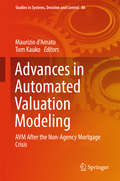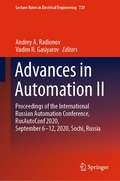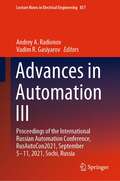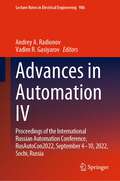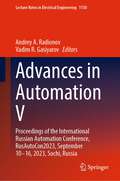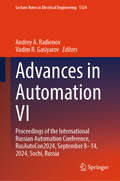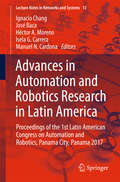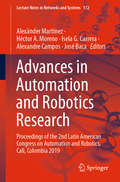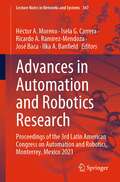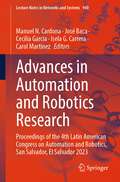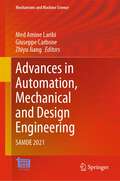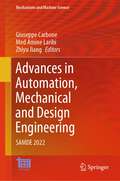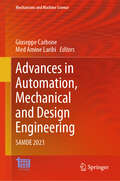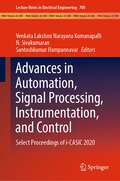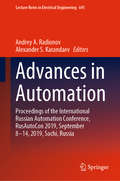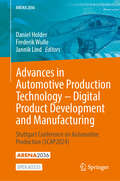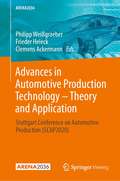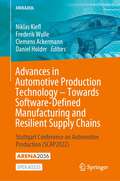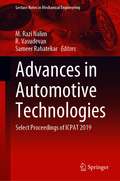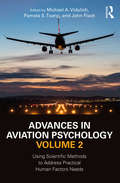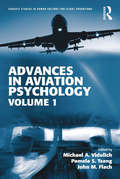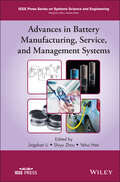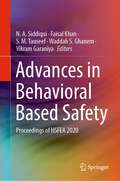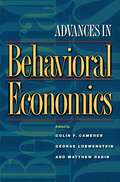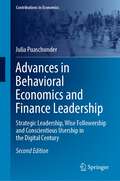- Table View
- List View
Advances in Automated Valuation Modeling: AVM After the Non-Agency Mortgage Crisis (Studies in Systems, Decision and Control #86)
by Maurizio D'Amato Tom KaukoThis book addresses several problems related to automated valuation methodologies (AVM). Following the non-agency mortgage crisis, it offers a variety of approaches to improve the efficiency and quality of an automated valuation methodology (AVM) dealing with emerging problems and different contexts. Spatial issue, evolution of AVM standards, multilevel models, fuzzy and rough set applications and quantitative methods to define comparables are just some of the topics discussed.
Advances in Automation II: Proceedings of the International Russian Automation Conference, RusAutoConf2020, September 6-12, 2020, Sochi, Russia (Lecture Notes in Electrical Engineering #729)
by Andrey A. Radionov Vadim R. GasiyarovThis book reports on innovative research and developments in automation. Spanning a wide range of disciplines, including communication engineering, power engineering, control engineering, instrumentation, signal processing and cybersecurity, it focuses on methods and findings aimed at improving the control and monitoring of industrial and manufacturing processes as well as safety. Based on the International Russian Automation Conference, held on September 6–12, 2020, in Sochi, Russia, the book provides academics and professionals with a timely overview of and extensive information on the state of the art in the field of automation and control systems, and fosters new ideas and collaborations between groups in different countries.
Advances in Automation III: Proceedings of the International Russian Automation Conference, RusAutoCon2021, September 5-11, 2021, Sochi, Russia (Lecture Notes in Electrical Engineering #857)
by Andrey A. Radionov Vadim R. GasiyarovThis book reports on innovative research and developments in automation. Spanning a wide range of disciplines, including communication engineering, power engineering, control engineering, instrumentation, signal processing and cybersecurity, it focuses on methods and findings aimed at improving the control and monitoring of industrial and manufacturing processes as well as safety. Based on the International Russian Automation Conference, held on September 5–11, 2021, in Sochi, Russia, the book provides academics and professionals with a timely overview of and extensive information on the state of the art in the field of automation and control systems, and fosters new ideas and collaborations between groups in different countries.
Advances in Automation IV: Proceedings of the International Russian Automation Conference, RusAutoCon2022, September 4-10, 2022, Sochi, Russia (Lecture Notes in Electrical Engineering #986)
by Andrey A. Radionov Vadim R. GasiyarovThis book reports on innovative research and developments in automation. Spanning a wide range of disciplines, including communication engineering, power engineering, control engineering, instrumentation, signal processing and cybersecurity, it focuses on methods and findings aimed at improving the control and monitoring of industrial and manufacturing processes as well as safety. Based on the International Russian Automation Conference, held on September 4–10, 2022, in Sochi, Russia, the book provides academics and professionals with a timely overview of and extensive information on the state of the art in the field of automation and control systems and fosters new ideas and collaborations between groups in different countries.
Advances in Automation V: Proceedings of the International Russian Automation Conference, RusAutoCon2023, September 10–16, 2023, Sochi, Russia (Lecture Notes in Electrical Engineering #1130)
by Andrey A. Radionov Vadim R. GasiyarovThis book reports on innovative research and developments in automation. Spanning a wide range of disciplines, including communication engineering, power engineering, control engineering, instrumentation, signal processing and cybersecurity, it focuses on methods and findings aimed at improving the control and monitoring of industrial and manufacturing processes as well as safety. Based on the 6th International Russian Automation Conference (RusAutoCon2023), held as a hybrid conference on September 10–16, 2023, in/from Sochi, Russia, this book provides academics and professionals with a timely overview of and extensive information on the state of the art in the field of automation and control systems. It is also expected to foster new ideas and collaborations between groups in different countries.
Advances in Automation VI: Proceedings of the International Russian Automation Conference, RusAutoCon2024, September 8–14, 2024, Sochi, Russia (Lecture Notes in Electrical Engineering #1324)
by Andrey A. Radionov Vadim R. GasiyarovThis book reports on innovative research and developments in automation. Spanning a wide range of disciplines, including communication engineering, control engineering, predictive engineering and machine learning, it focuses on methods and findings aimed at improving the control and monitoring of industrial and manufacturing processes as well as their reliability. Based on the 7th International Russian Automation Conference (RusAutoCon2024), held as a hybrid conference on September 8–14, 2024, in/from Sochi, Russia, this book provides academics and professionals with a timely overview of and extensive information on the state of the art in the field of automation and control systems. It is also expected to foster new ideas and collaborations between groups in different countries.
Advances in Automation and Robotics Research in Latin America: Proceedings of the 1st Latin American Congress on Automation and Robotics, Panama City, Panama 2017 (Lecture Notes in Networks and Systems #13)
by Ignacio Chang José Baca Héctor A. Moreno Isela G. Carrera Manuel N. CardonaThis book contains the proceedings of the 1st Latin American Congress on Automation and Robotics held at Panama City, Panama in February 2017. It gathers research work from researchers, scientists, and engineers from academia and private industry, and presents current and exciting research applications and future challenges in Latin American. The scope of this book covers a wide range of themes associated with advances in automation and robotics research encountered in engineering and scientific research and practice. These topics are related to control algorithms, systems automation, perception, mobile robotics, computer vision, educational robotics, robotics modeling and simulation, and robotics and mechanism design. LACAR 2017 has been sponsored by SENACYT (Secretaria Nacional de Ciencia, Tecnologia e Inovacion of Panama).
Advances in Automation and Robotics Research: Proceedings of the 2nd Latin American Congress on Automation and Robotics, Cali, Colombia 2019 (Lecture Notes in Networks and Systems #112)
by José Baca Héctor A. Moreno Isela G. Carrera Alexánder Martínez Alexandre CamposThis book gathers the proceedings of the 2nd Latin American Congress on Automation and Robotics, held at Pontificia Universidad Javeriana de Cali, Colombia, on October 30th–November 1st, 2019. It presents papers from researchers, scientists, and engineers from academia and industry, and explores current exciting research applications and future challenges, mainly in Latin American countries. The book covers a wide range of research fields associated with automation and robotics encountered in engineering, scientific research, and practice, including: autonomous systems, multi-robot and multi-agent systems, industrial automation and robotics, process control, modeling and optimization, control theory, artificial intelligence, kinematic and dynamic analysis of robotic systems, computer vision, self-localization, mapping and navigation, instruments, sensing and sensor fusion, evolutionary, bio-inspired, micro/nano, and soft robotics, novel robot designs, haptics, human–robot interaction and interfaces, simulation procedures, experimental validations, and educational robotics.
Advances in Automation and Robotics Research: Proceedings of the 3rd Latin American Congress on Automation and Robotics, Monterrey, Mexico 2021 (Lecture Notes in Networks and Systems #347)
by José Baca Héctor A. Moreno Isela G. Carrera Ricardo A. Ramírez-Mendoza Ilka A. BanfieldThis book gathers the proceedings of the 3rd Latin American Congress on Automation and Robotics, held at Monterrey, Mexico, on November 17–19, 2021. This book presents recent advances in the modeling, design, control, and development of autonomous and robotic systems and explores current exciting applications and future challenges of these technologies. The scope of this book covers a wide range of research fields associated with automation and robotics encountered within engineering, scientific research, and practice. These topics are related to autonomous systems, industrial automation and robotics, modelling and systems identification, simulation procedures and experimental validations, control theory, artificial intelligence, computer vision, sensing and sensor fusion, multi-robot and multi-agent systems, field and service robotics, human robot interaction and interfaces, modelling of robotic systems, and the design of new robotic platforms.
Advances in Automation and Robotics Research: Proceedings of the 4th Latin American Congress on Automation and Robotics, San Salvador, El Salvador 2023 (Lecture Notes in Networks and Systems #940)
by José Baca Isela G. Carrera Manuel N. Cardona Cecilia Garcia Carol MartinezThis book gathers the proceedings of the 4th Latin American Congress on Automation and Robotics, held at San Salvador, El Salvador, on November 15–17, 2023. This book presents recent advances in the modeling, design, control, and development of autonomous and robotic systems and explores current exciting applications and future challenges of these technologies. The scope of this book covers a wide range of research fields associated with automation and robotics encountered within engineering, scientific research, and practice. These topics are related to control theory, Robot Operating System (ROS), robot design, collaborative robots, artificial intelligence, computer vision, sensing, field and service robotics, human robot interaction and interfaces, modeling of robotic systems, industry 4.0, and the design of new robotic platforms.
Advances in Automation, Mechanical and Design Engineering: SAMDE 2021 (Mechanisms and Machine Science #121)
by Giuseppe Carbone Med Amine Laribi Zhiyu JiangThis book presents the proceedings of the 2021 International Symposium on Automation, Mechanical and Design Engineering (SAMDE), held in Beijing, China, on 3–5 December 2021, and organized by the Hong Kong Society of Robotics and Automation (HKSRA). It gathers contributions by researchers from several countries on the following topics: digitalized development and use of sustainable products and manufacturing systems, artificial intelligence, automated reasoning, human-robot collaborative interaction, sensors and autonomous sensor systems, cyber-physical control systems, generative design including topology optimization, advanced simulation and modelling, intelligent automation, smart materials, materials processing and factories, and circular economy, etc. The book offers a source of information and inspiration for researchers seeking to improve their work and gather new ideas for future developments.
Advances in Automation, Mechanical and Design Engineering: SAMDE 2022 (Mechanisms and Machine Science #138)
by Giuseppe Carbone Med Amine Laribi Zhiyu JiangThis book presents the proceedings of the 2022 3rd International Symposium on Automation, Mechanical and Design Engineering (SAMDE), held in Beijing, China, on December 16–18, 2022, and organized by the Hong Kong Society of Robotics and Automation (HKSRA). It gathers contributions by researchers from several countries on the following topics: digitalized development and use of sustainable products and manufacturing systems, artificial intelligence, automated reasoning, human–robot collaborative interaction, sensors and autonomous sensor systems, cyber-physical control systems, generative design including topology optimization, advanced simulation and modelling, intelligent automation, smart materials, materials processing and factories, and circular economy, etc. The book offers a source of information and inspiration for researchers seeking to improve their work and gather new ideas for future developments.
Advances in Automation, Mechanical and Design Engineering: SAMDE 2023 (Mechanisms and Machine Science #161)
by Giuseppe Carbone Med Amine LaribiThis book presents the proceedings of the 2023 4th International Symposium on Automation, Mechanical and Design Engineering (SAMDE), held in Nanjing, China, on December 8–10, 2023. It gathers contributions by researchers from several countries on the following topics: digitalized development and use of sustainable products and manufacturing systems, artificial intelligence, automated reasoning, human–robot collaborative interaction, sensors and autonomous sensor systems, cyber-physical control systems, generative design including topology optimization, advanced simulation and modelling, intelligent automation, smart materials, materials processing and factories, and circular economy, etc. The book offers a source of information and inspiration for researchers seeking to improve their work and gather new ideas for future developments.
Advances in Automation, Signal Processing, Instrumentation, and Control: Select Proceedings of i-CASIC 2020 (Lecture Notes in Electrical Engineering #700)
by Venkata Lakshmi Narayana Komanapalli N. Sivakumaran Santoshkumar HampannavarThis book presents the select proceedings of the International Conference on Automation, Signal Processing, Instrumentation and Control (i-CASIC) 2020. The book mainly focuses on emerging technologies in electrical systems, IoT-based instrumentation, advanced industrial automation, and advanced image and signal processing. It also includes studies on the analysis, design and implementation of instrumentation systems, and high-accuracy and energy-efficient controllers. The contents of this book will be useful for beginners, researchers as well as professionals interested in instrumentation and control, and other allied fields.
Advances in Automation: Proceedings of the International Russian Automation Conference, RusAutoCon 2019, September 8-14, 2019, Sochi, Russia (Lecture Notes in Electrical Engineering #641)
by Andrey A. Radionov Alexander S. KarandaevThis book reports on innovative research and developments in automation.The chapters spans a wide range of disciplines, including communication engineering, power engineering, control engineering, instrumentation,signal processing and cybersecurity. Emphasis is given to methods and findings aimed at fostering better control and monitoring of industrial and manufacturing processes, and improving safety. Based on the International Russian Automation Conference, held in September 8-14, 2019, in Sochi,Russia, the book provides academics and professionals with a timely overview and extensive information on the state of the art in the field of automation and control systems, and is expected to foster new idea, as well as collaboration between different groups in different countries.
Advances in Automotive Production Technology – Digital Product Development and Manufacturing: Stuttgart Conference on Automotive Production (SCAP2024) (ARENA2036)
by Frederik Wulle Daniel Holder Jannik LindThis open access book compiles the outcome of the 3rd Stuttgart Conference on Automotive Production (SCAP2024). The peer-reviewed contributions in this book are arranged thematically in four parts and cover a wide variety of topics: (A) Digital Methods and Models, (B) Digitalization of the Industrial and Automotive Value Chain, (C) Data-Driven Technologies, and (D) Sustainability and Circular Economy. SCAP2024 was organized by ARENA2036 in close collaboration with the Institute for Control Engineering of Machine Tools and Manufacturing Units of the University of Stuttgart. The conference took place on site from November 20–22, 2024, and provided the opportunity for national and international scientists to present their latest research results. The conference has taken another big step in becoming an established forum for topics related to the production and mobility of the future. The great success of this year's conference will be continued with the next SCAP in 2026 with new forward-looking topics
Advances in Automotive Production Technology – Theory and Application: Stuttgart Conference on Automotive Production (SCAP2020) (ARENA2036)
by Clemens Ackermann Philipp Weißgraeber Frieder HeieckThis volume of the series ARENA2036 compiles the outcomes of the first Stuttgart Conference on Automotive Production (SCAP2020). It contains peer-reviewed contributions from a theoretical as well as practical vantage point and is topically structured according to the following four sections: It discusses (I) Novel Approaches for Efficient Production and Assembly Planning, (II) Smart Production Systems and Data Services, (III) Advances in Manufacturing Processes and Materials, and (IV) New Concepts for Autonomous, Collaborative Intralogistics.Given the restrictive circumstances of 2020, the conference was held as a fully digital event divided into two parts. It opened with a pre-week, allowing everyone to peruse the scientific contributions at their own pace, followed by a two-day live event that enabled experts from the sciences and the industry to engage in various discussions. The conference has proven itself as an insightful forum that allowed for an expertly exchange regarding the pivotal Advances in Automotive Production and Technology.
Advances in Automotive Production Technology – Towards Software-Defined Manufacturing and Resilient Supply Chains: Stuttgart Conference on Automotive Production (SCAP2022) (ARENA2036)
by Clemens Ackermann Niklas Kiefl Frederik Wulle Daniel HolderThis volume of the series ARENA2036 compiles the outcome of the 2nd Stuttgart Conference on Automotive Production (SCAP2022). The peer-reviewed contributions in this book are arranged thematically in three parts and cover a wide variety of topics: (A) Software-defined Manufacturing, (B) Data-driven Technologies, and (C) Advanced Manufacturing and Sustainability. SCAP2022 was organized by ARENA2036 in close collaboration with the Institute for Control Engineering of Machine Tools and Manufacturing Units of the University of Stuttgart. The Conference took place on site from November 16 - 18, 2022 and provided the opportunity for national and international scientists to present their latest research results. The conference has taken another big step in becoming an established forum for topics related to the production of the future. The great success of this year's conference will be continued with the next SCAP in 2024 with new forward-looking topics. This is an open access book.
Advances in Automotive Technologies: Select Proceedings of ICPAT 2019 (Lecture Notes in Mechanical Engineering)
by M. Razi Nalim R. Vasudevan Sameer RahatekarThis book contains selected papers from the International Conference on Progress in Automotive Technologies (ICPAT) 2019. The contents focus on several aspects of the automobile industry from design to manufacture, and the challenges involved therein. The book covers latest research trends in the automotive domain including topics such as aerodynamic design, vehicle sensors and electronics, engine combustion modeling, noise and vibration in vehicles, electric and hybrid vehicles, automotive tribology, and battery and fuel cell technologies. The book highlights the use of emerging technologies to tackle the growing environmental challenges. This book will be of interest to students, researchers as well as professionals working in automotive engineering and allied fields.
Advances in Aviation Psychology, Volume 2: Using Scientific Methods to Address Practical Human Factors Needs
by Michael A. Vidulich Pamela S. Tsang John FlachSince 1981, the biennial International Symposium on Aviation Psychology (ISAP) has been convened for the purposes of (a) presenting the latest research on human performance problems and opportunities within aviation systems, (b) envisioning design solutions that best utilize human capabilities for creating safe and efficient aviation systems, and (c) bringing together scientists, research sponsors, and operators in an effort to bridge the gap between research and applications. Though rooted in the presentations of the 18th ISAP, held in 2015 in Dayton, Ohio, Advances in Aviation Psychology is not simply a collection of selected proceedings papers. Based upon the potential impact of emerging trends, current debates or enduring issues present in their work, select authors were invited to expand upon their work following the benefit of interactions at the symposium. Consequently the volume includes discussion of the most pressing research priorities and the latest scientific and technical priorities for addressing them. This book is the second in a series of volumes. The aim of each volume is not only to report the latest findings in aviation psychology but also to suggest new directions for advancing the field.
Advances in Aviation Psychology: Volume 1 (Ashgate Studies in Human Factors for Flight Operations #1)
by Michael A. VidulichAviation remains one of the most active and challenging domains for human factors and applied psychology. Since 1981, the biennial International Symposium on Aviation Psychology (ISAP) has been convened for the purposes of (a) presenting the latest research on human performance problems and opportunities within aviation systems, (b) envisioning design solutions that best utilize human capabilities for creating safe and efficient aviation systems, and (c) bringing together scientists, research sponsors, and operators in an effort to bridge the gap between research and application. Though rooted in the presentations of the 17th ISAP, held in 2013 in Dayton, Ohio, Advances in Aviation Psychology is not simply a collection of selected proceeding papers. Based upon the potential impact on emerging trends, current debates or enduring issues present in their work, select authors were invited to expand on their work following the benefit of interactions at the symposium. The invited authors include the featured keynote and plenary speakers who are all leading scientists and prominent researchers that were selected to participate at the symposium. These contributions are supplemented by additional contributors whose work best reflects significant developments in aviation psychology. Consequently the volume includes visions for the next generation of air management and air traffic control, the integration of unmanned (i.e. remotely piloted vehicles) into operational air spaces, and the use of advanced information technologies (e.g. synthetic task environments) for research and training. This book is the first in a series of volumes to be published in conjunction with each subsequent ISAP. The aim of each volume is not only to report the latest findings in aviation psychology but also to suggest new directions for advancing the field.
Advances in Battery Manufacturing, Service, and Management Systems
by Yehui Han Jingshan Li Shiyu ZhouAddresses the methodology and theoretical foundation of battery manufacturing, service and management systems (BM2S2), and discusses the issues and challenges in these areas This book brings together experts in the field to highlight the cutting edge research advances in BM2S2 and to promote an innovative integrated research framework responding to the challenges. There are three major parts included in this book: manufacturing, service, and management. The first part focuses on battery manufacturing systems, including modeling, analysis, design and control, as well as economic and risk analyses. The second part focuses on information technology's impact on service systems, such as data-driven reliability modeling, failure prognosis, and service decision making methodologies for battery services. The third part addresses battery management systems (BMS) for control and optimization of battery cells, operations, and hybrid storage systems to ensure overall performance and safety, as well as EV management. The contributors consist of experts from universities, industry research centers, and government agency. In addition, this book: Provides comprehensive overviews of lithium-ion battery and battery electrical vehicle manufacturing, as well as economic returns and government support Introduces integrated models for quality propagation and productivity improvement, as well as indicators for bottleneck identification and mitigation in battery manufacturing Covers models and diagnosis algorithms for battery SOC and SOH estimation, data-driven prognosis algorithms for predicting the remaining useful life (RUL) of battery SOC and SOH Presents mathematical models and novel structure of battery equalizers in battery management systems (BMS) Reviews the state of the art of battery, supercapacitor, and battery-supercapacitor hybrid energy storage systems (HESSs) for advanced electric vehicle applications Advances in Battery Manufacturing, Services, and Management Systems is written for researchers and engineers working on battery manufacturing, service, operations, logistics, and management. It can also serve as a reference for senior undergraduate and graduate students interested in BM2S2. Jingshan Li is a Professor in the Department of Industrial and Systems Engineering at the University of Wisconsin-Madison, USA. He received his PhD in Electrical Engineering - Systems at the University of Michigan, USA. Shiyu Zhou is a Professor in the Department of Industrial and Systems Engineering at the University of Wisconsin-Madison, USA. He received his PhD in Mechanical Engineering at the University of Michigan, USA. Yehui Han is an Assistant Professor in the Department of Electrical and Computer Engineering at the University of Wisconsin-Madison, USA. He received his PhD in Electrical Engineering at the Massachusetts Institute of Technology, USA.
Advances in Behavioral Based Safety: Proceedings of HSFEA 2020
by S. M. Tauseef N. A. Siddiqui Faisal Khan Waddah S. Ghanem Vikram GaraniyaThis book presents the proceedings of the International Conference on Health, Safety, Fire, Environment, and Allied Sciences 2020. It highlights latest developments in the field of science and technology aimed at improving health and safety in the workplace. The volume comprises content from leading scientists, engineers, and policy makers discussing issues relating to industrial safety, fire hazards and their management in industry, forests and other settings. Also dealt with are issues of occupational health in engineering, process and agricultural industry and protection against incidents of arson and terror attacks. The contents of this volume will be of interest to researchers, practitioners, and policy makers alike.
Advances in Behavioral Economics
by Colin F. Camerer George Loewenstein Matthew RabinTwenty years ago, behavioral economics did not exist as a field. Most economists were deeply skeptical--even antagonistic--toward the idea of importing insights from psychology into their field. Today, behavioral economics has become virtually mainstream. It is well represented in prominent journals and top economics departments, and behavioral economists, including several contributors to this volume, have garnered some of the most prestigious awards in the profession.This book assembles the most important papers on behavioral economics published since around 1990. Among the 25 articles are many that update and extend earlier foundational contributions, as well as cutting-edge papers that break new theoretical and empirical ground.Advances in Behavioral Economics will serve as the definitive one-volume resource for those who want to familiarize themselves with the new field or keep up-to-date with the latest developments. It will not only be a core text for students, but will be consulted widely by professional economists, as well as psychologists and social scientists with an interest in how behavioral insights are being applied in economics.The articles, which follow Colin Camerer and George Loewenstein's introduction, are by the editors, George A. Akerlof, Linda Babcock, Shlomo Benartzi, Vincent P. Crawford, Peter Diamond, Ernst Fehr, Robert H. Frank, Shane Frederick, Simon Gächter, David Genesove, Itzhak Gilboa, Uri Gneezy, Robert M. Hutchens, Daniel Kahneman, Jack L. Knetsch, David Laibson, Christopher Mayer, Terrance Odean, Ted O'Donoghue, Aldo Rustichini, David Schmeidler, Klaus M. Schmidt, Eldar Shafir, Hersh M. Shefrin, Chris Starmer, Richard H. Thaler, Amos Tversky, and Janet L. Yellen.
Advances in Behavioral Economics and Finance Leadership: Strategic Leadership, Wise Followership and Conscientious Usership in the Digital Century (Contributions to Economics)
by Julia PuaschunderThis book explores human decision-making heuristics. The monograph studies how nudging and winking can help citizens to make rational choices and governments to create choice architectures that aid in stabilizing markets and flourishing society. By applying the behavioral economics approach to political outcomes, it demonstrates how economics can be employed for personal benefits but also foster the greater societal good. A review of the current literature on human decision-making advantages and failures in Europe and North America opens the book. A wide range of nudges and winks is presented that aid to curb the harmful consequences of human decision-making fallibility. Awareness of mental heuristics and biases in the finance domain is strengthened in order to understand how to nudge people to benefit from economic markets but also help governments to stabilize economies in providing strategic market communication. The author also proposes concrete leadership and followership directives on nudging in the digital age. This book appeals to scholars and policy makers interested in rational decision-making. The behavioral perspective features the strategic use of nudging and winking in the digital age.The second revised and expanded edition offers the newest insights on behavioral e-Economics and the latest developments regarding the COVID-19 pandemic. It covers topics such as the role of social media in finance and discrimination in searchplace competition. It also offers new insights on strategic leadership and smart followership directives to successfully navigate through complex and fast-paced e-architectures.
